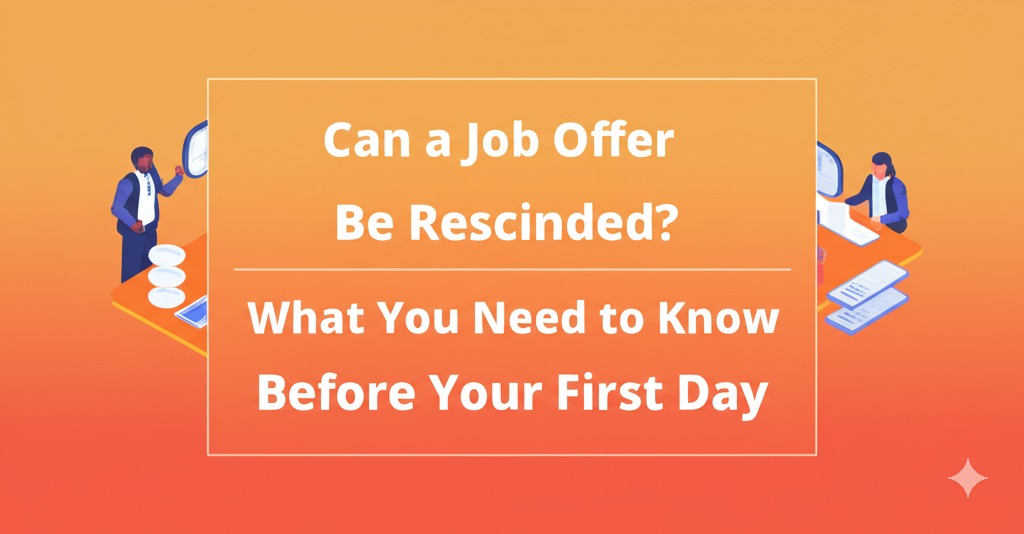
Landing a job offer can feel like a huge win—your resume made it through the filters, you nailed the interviews, and now you’ve got an offer in hand. But what happens if that offer is suddenly pulled away?
Yes, a job offer can be rescinded, and while it’s not common, it does happen for a variety of reasons. Whether you’re a recent graduate or a seasoned professional, understanding the risks—and your rights—can save you from future surprises.
In this article, we’ll break down when and why a job offer might be rescinded, what your options are, and how to protect yourself moving forward.
Why Would a Job Offer Be Rescinded?
There are several legitimate reasons an employer might withdraw a job offer. While it’s disappointing, many of these reasons are outside of your control.
1. Failed Background Check or Drug Test
Most job offers are contingent upon background checks or drug screenings. If something negative shows up—like a criminal record, falsified education, or failed drug test—the employer may rescind the offer.
2. Budget Cuts or Internal Restructuring
Sometimes companies run into unexpected financial issues. Budget freezes, layoffs, or organizational restructuring can cause a company to halt new hires—even if they already extended offers.
3. Negative References or Social Media Activity
If a reference provides concerning feedback, or if your public social media shows behavior that doesn’t align with company values, that can be grounds for reconsideration.
4. Candidate Misrepresentation
If you inflate your qualifications or experience, and the employer finds out before your start date, they may pull the offer. Honesty really is the best policy during the hiring process.
5. Delay in Response or Acceptance
Waiting too long to accept an offer or trying to negotiate excessively without clear communication can sometimes frustrate employers to the point of rescinding the offer.
Is It Legal for a Company to Rescind a Job Offer?
In most cases, yes, it’s legal—but there are exceptions.
Employment-at-Will Doctrine
In the U.S., most employment is “at-will,” which means either the employer or the employee can end the employment relationship at any time, for almost any reason.
That includes withdrawing a job offer before your first day.
Exceptions to the Rule
There are certain scenarios where rescinding an offer could be illegal:
- Discrimination: If the offer is withdrawn based on race, gender, age, religion, or disability, it could violate Equal Employment Opportunity laws.
- Retaliation: If you reported misconduct or filed a complaint, rescinding an offer could be considered retaliation.
- Written Contracts: If you have a signed employment contract with specific terms, rescinding the offer might breach that agreement.
If you suspect foul play, consulting with an employment lawyer is a smart move.
What Should You Do If a Job Offer Is Rescinded?
It can be a shock, but you do have options. Here’s how to respond professionally and proactively:
1. Ask for Clarification
Before reacting, politely ask the employer why the offer was withdrawn. Understanding the reason can help you respond appropriately or even negotiate a resolution.
2. Review the Offer Letter
Check the original offer letter for any contingencies, such as background checks or start dates. This can help you understand whether the employer acted within their stated rights.
3. Explore Legal Options
If the decision seems discriminatory or retaliatory, you may have a case. Reach out to:
- An employment attorney
- Your local Equal Employment Opportunity Commission (EEOC) office
4. Start the Job Hunt Again
As disappointing as it is, try to move forward quickly. Revamp your resume, update your LinkedIn, and start applying again.
5. Keep Emotions in Check
It’s easy to feel angry or betrayed, but burning bridges won’t help. Respond professionally—you never know when paths might cross again.
Can You Protect Yourself From a Rescinded Job Offer?
While you can’t eliminate all risks, there are ways to minimize them.
Tips to Safeguard Your Offer:
- Get everything in writing. A verbal offer isn’t legally binding.
- Be transparent. Don’t hide past employment issues or criminal records.
- Don’t resign too early. Wait until the new offer is confirmed and background checks are cleared.
- Ask about contingencies. Find out if the offer depends on anything, like references or funding approval.
Being cautious doesn’t mean you’re pessimistic—it means you’re prepared.
Final Thoughts: Stay Informed, Stay Prepared
So, can a job offer be rescinded? Yes, and it happens more often than people realize. But knowing the reasons why, understanding your rights, and preparing for contingencies can help you handle it with confidence.
If you’ve had an offer pulled back, you’re not alone—and it’s not the end of the road. Use it as a stepping stone to something better.

Andre Cuevas provides career insights, job search strategies, and professional advice to help individuals navigate the job market and achieve their career goals.





